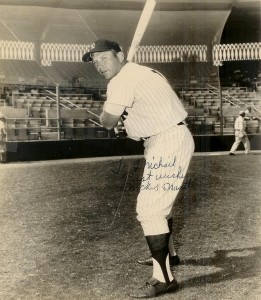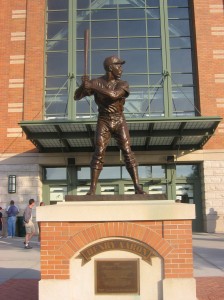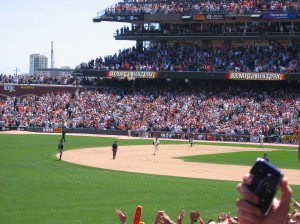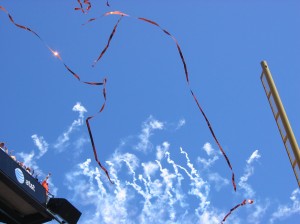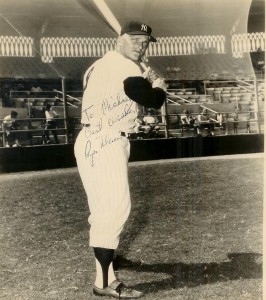The baseball world was stunned this week to hear that Ryan Braun, the National League’s Most Valuable Player, reportedly tested positive for performance-enhancing-drugs.

The 28-year old slugger hit .332 this year, with 33 home runs and 111 runs batted in to help the Milwaukee Brewers capture the flag in the National League Central Division with 96 wins.
Braun is denying the allegations but faces a 50 game suspension if his appeal is unsuccessful. The odds are overwhelmingly against him, considering that no player has even won an appeal with Major League Baseball after testing positive. Braun has never before been tainted by the stigma of steroids and he’s very popular in Milwaukee where the Brewers have promoted him as a positive role model.
So is Braun just another fallen hero? Or should we stop elevating athletes as role models, knowing they are human too and often make mistakes like the rest of us? As a kid, I can remember idolizing Mickey Mantle. Here is one of my most prized possessions – an autographed picture of Mickey Mantle:
My dad took me to dozens of games at Yankee Stadium, where Mickey would always inspire me with his mammoth home runs and Giselle-like speed in the outfield. He was my hero – the guy you always wanted batting with the bases loaded in the bottom of the ninth. When I was young, I dreamed of one-day playing center field for the New York Yankees.
Later, as I grew older, I learned that Mickey was a mere mortal whose predilection for alcohol and wild women made him a flawed human being, although I still loved Mantle as a baseball player. As a teenager I came to realize the dangers of worshiping athletes as heroes, for they were more likely to disappoint you then inspire you.
But there are plenty of exceptions to the rule. Jackie Robinson blazed the trail for civil rights when he joined the starting lineup of the Brooklyn Dodgers in 1947 – and in so doing broke the color line to integrate the game of baseball. As baseball’s first black ballplayer of the modern era, Robinson endured racial taunting, verbal abuse and rampant discrimination from fans and fellow players alike. Some opposing team players would openly try to cut him with their spikes while sliding into second base. Yet Robinson persevered by out-hitting them and out-running them on the basepaths, where he played with guts, grit and gallantry to begrudgingly win the respect of his opponents.
Jackie Robinson was a hero to millions of Americans – not just baseball fans – for playing with dignity and determination under the most challenging of circumstances. His teammate, Pee Wee Reese showed courage and camaraderie by wrapping his arm around Robinson to demonstrate support for the young star at the ballpark, where fans were shouting racial epithets at him from the stands in Cincinnati.
Yes Robinson and Reese were role models for a nation in desperate need of inspiration – living proof that America could in fact rise above its racist roots and fully embrace its promise as a land of equal opportunity. Baseball in fact, has had many heroic players. Hank Aaron, the Atlanta Braves legend, faced death threats in his quest to shatter Babe Ruth’s record of 714 lifetime home runs. Aaron, with a quiet sense of dignity to match his God-given talents, finished his career with 755 home runs – every one of them natural.
Three decades later, Barry Bonds would eclipse Hank Aaron as the greatest home run hitter. Yet Bonds is considered a negative role model because of the stain of performance-enhancing-drugs surrounding his career. While Bonds is unlikely to ever make the Baseball Hall of Fame, his quest for the home run record is historic, if not heroic.
My son Matt and I were at the ballpark in San Francisco in 2006, when Bonds hit a towering home run to beat Babe Ruth with 715 career dingers. It was the most electrifying moment I’ve ever experienced in baseball – pure excitement as fireworks filled the air while orange and black streamers fell from the sky, sending the San Francisco faithful into a frenzy.
I wondered what Bonds was thinking as he rounded the bases.
“I’ll tell you what was going though his mind,” my friend Ron Hyde said in an interview for my book, Baseball Between Us. Ron was Barry’s “baby sitter” growing up – and knew exactly what Bonds was feeling.
“It wasn’t the 755 Hank Aaron record. Barry Bonds always pointed out that the record he was targeting was the 714 home runs set by Babe Ruth. Barry though Babe Ruth garnered a lot of attention fairly or unfairly, in an era when black ballplayers were not allowed to play the game. He cites a lot of heroes in his lifetime, but he always pointed out he was going after the Babe because he felt that black ballplayers didn’t get their shot,” Ron explained.
In Bonds’ mind, the 715th home run was victory for civil rights as much as it was a personal baseball achievement. My point is that finding heroes and villains in baseball is not as easy as it might seem – nothing is black and white – most things on the diamond have a shade of gray and are heavily nuanced – just as they are in real life.
Perhaps baseball is a reflection of society more than it is a breeding ground for role models. For years, baseball denigrated the accomplishments of Roger Maris, who hit 61 all-natural home runs in the 1961 season. That was the year Major League Baseball expanded its season from 154 games to 162 games to accommodate two new teams – the Los Angeles Angels and the Washington Senators. But because Roger Maris his 61st homer on the last game of the season, Baseball Commissioner Ford Frick declared that Maris’s record should be marked by an asterisk * to indicate that Babe Ruth – and not Roger Maris – was the real home run record. Here’s my autographed picture of Roger Maris:
As I point out in Baseball Between Us, Maris had missed a couple of game in the ’61 season and had only seven more at bats than Babe Ruth, yet Frick was determined to slight Maris with a lesser achievement. It wasn’t until many years later that a new baseball commissioner by the name of Fay Vincent would remove the asterisk from the record books forever, crediting Roger Maris with the glory he so justly deserved.
In the end, baseball did the right thing, just as the sport began utilizing rigid drug testing to combat the stigma of steroids. Who would have suspected that Ryan Braun, one of the new generation stars, would become ensnared in that net of deception? Braun insists the test was flawed and that a secondary test will exonerate him. Let’s hope for the sake of baseball he is right.
But the underlying message here is a warning to kids – don’t put players on a pedestal high above the mantle (double entendre intended) because they’re likely to fall off. Instead, look for role models closer to home – a parent, a sibling, a teacher perhaps – someone who can serve as a mentor and guide in living by example. Chances are, that person will make mistakes too – after all, we are human – but learning from your mistakes can help right a wrong – and provide a valuable lesson about life. Ultimately, you’ll learn to rely on yourself and become the captain of your own ship. Just bear in mind, the course you select will always have its fair share of storms and at some point you will get soaked. But in the long run you’ll find a pathway that’s unique and right for you.
The game of baseball is bigger than any one player. For every Ryan Braun who stumbles, there is an unheralded player who is simply in love with the game. And baseball is trying to do all the right things. This year, baseball has enacted a tough new policy anti-tobacco policy that prohibits players and coaches from carrying smokeless tobacco tins in their uniforms. Tobacco use is also forbidden during interviews and promotional appearances involving a team. That’s a good first step in setting an example for kids.
Baseball’s RBI (Reviving Baseball in Inner Cities) has provided great opportunities for thousands of kids who might otherwise not be exposed to baseball. Many players visit kids in the hospital or participate in charitable work. It’s natural for young fans to idolize their baseball heroes. But one day they’ll understand that while players come and go – baseball is a tradition that allows generations of fans to enjoy the magic of the game. Ultimately the best role model is someone dedicated to making the world a better place. All of us can look from within to find the person willing to help.


